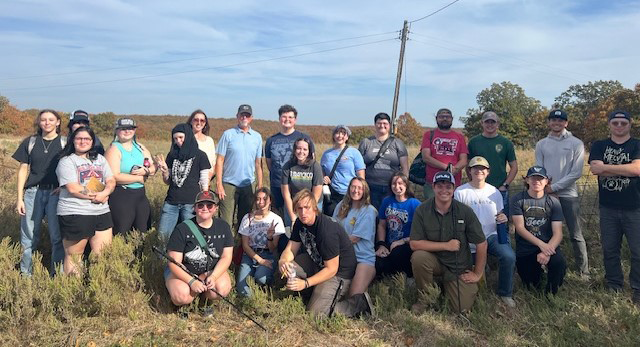
RSU Biology Professor Keith Martin is no stranger to field trips.
Over the course of his 35-plus years in education, Martin estimates he’s taken student groups into the field at least 500 times to experience what they’ve been studying outside of a textbook.
But his most recent trip – to the Pearl Jackson Crosstimbers Preserve in Creek County – marks his final outing, as this is Martin’s last semester at Rogers State University.
“This (fall 2024) semester is my last on the ground – I’ll do a little more online work – I have some seniors whose capstone projects I’ll still be supervising, but (wife) Lisa and I are planning a move to Colorado to be closer to our daughter and four grandkids there,” Dr. Martin said. “So, after decades of taking students out into the field, my most recent one was my last one.”
Martin said he first started the practice of taking groups of students on science-related field trips in the mid-80s when he was a junior high teacher in Owasso.
“We had a science club – this was in the fall of 1986 – and I took a group of my students to Black Mesa,” he recalled. “The students loved the experience, and I quickly learned how impactful it is for students to have a tactile experience with the things they’re reading about in class. It gives them a whole new dimension to subject matter.”
After coming to work at RSU – when it was still Rogers State College – Martin continued the practice of leading field trips – some of them day trips, some overnight – to introduce students to the material in a real-life setting.
“Whenever I took a group out (into the field), I wouldn’t lecture them or ‘instruct’ them – it was always just the opportunity for them to gain an appreciation for nature and biology that they couldn’t get in the classroom, it changes their concept of life forms from the theoretical to the practical. There’s no way for them to fully get that without the kind of hands-on interactions they have in the field.”
During Martin’s most recent field trip, his students studied plant life (“Much easier to catch than animals,” he joked), although he’s taken several groups to dig crystals, trap, observe, and release wildlife, and more.
“It’s not uncommon for the students to chase snakes, lizards, bats, birds, rats, especially kangaroo rats, which are little desert rats with long tails and big hind feet,” he said. “The students always have protection and always take care of the animals they study before they’re released again. It’s really an effective way for them to appreciate the plants or animals we’re in the field to study.”
Over the years, Martin has made numerous trips to Black Mesa, the Salt Plains, Broken Bow and “all over the state,” as well as the occasional trip to Colorado, with each trip being as unique and memorable as the students within the groups.
“I’ve gone on a lot of great trips – I regularly hear back from former students of mine who tell me that these field trips were their favorite part of college, which is always nice to hear, very touching,” he said. “One of the coolest things alumni will write to remind me about is me taking them to a cave in Freedom (Oklahoma) and watching about a million bats emerge – it’s a phenomenal site, a remarkable wildlife viewing opportunity that they never forget, one which goes on for about an hour and is an experience everyone should have.”
As Martin reflects on the countless field trips taken, he said he’s thankful for all the professional and personal relationships to have come from his time at RSU, as well as deeply appreciative for the university’s support.
“The institution has always been very kind, very supportive of encouraging opportunities, such as the many field trips taken over the years, for the students to have a unique learning experience,” he said. “From a transportation standpoint, from a funding standpoint, the university, the institution has long been supportive, and I’m deeply appreciate, knowing it’s ultimately the students who benefit the most (from the field trips).”
During his time at RSU, Dr. Martin served as instructor of biology, assistant professor of biology, associate professor of biology, professor of biology and department head of the Department of Mathematics and Science. From 2008 to 2023, he served as dean of the College of Arts and Sciences (formerly the School of Arts and Sciences).
Although he said he’ll miss Rogers State University, it’s the “right time” for he and his wife to make the move to Colorado.
“I’m excited about being a taxi for the kids,” he said. “I’m hoping to continue some of my research after we move – there’s a lot of research opportunities with bats, so I’d like to pursue that, and maybe do some online instruction – that, and a lot of hiking, a little mountain biking and skiing. We have another child who lives in Oklahoma, so we will be coming back to visit, but I’m looking forward to this next chapter in my life.”
Rogers State University Bachelor of Science in biology, environmental option, emphasizes taxonomy and game management and includes courses in ecosystem management, landscape ecology, plant and animal toxicology, aquatic biology and threats to diversity.
For more information about RSU’s Biology degree programs, visit www.rsu.edu/biology.

